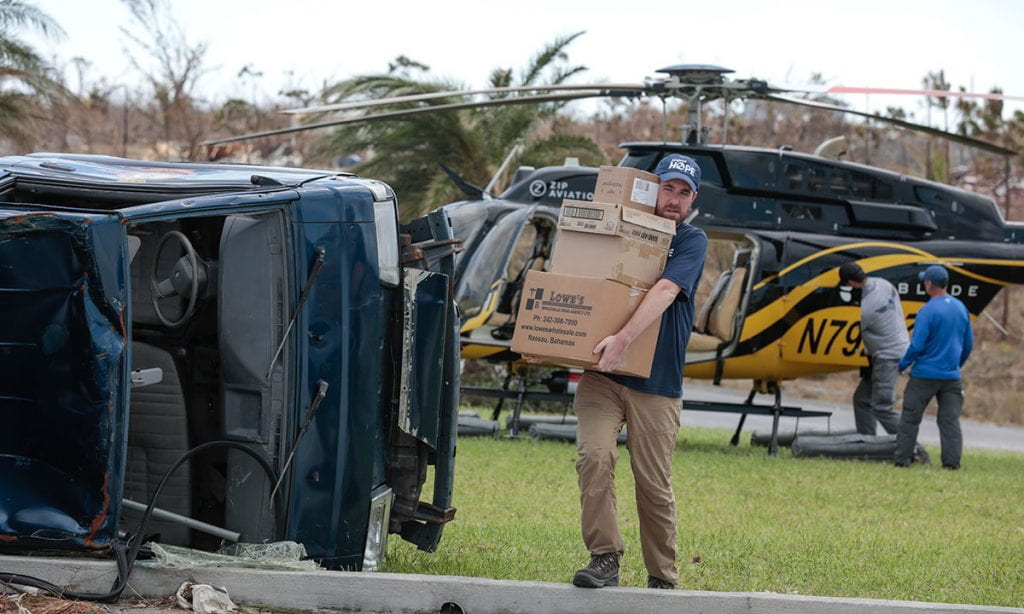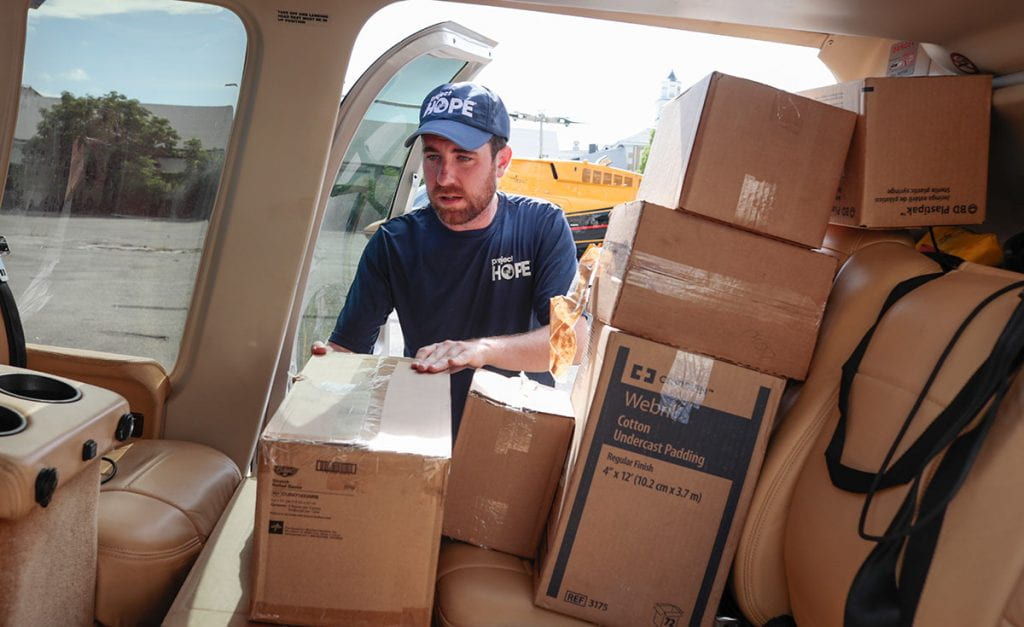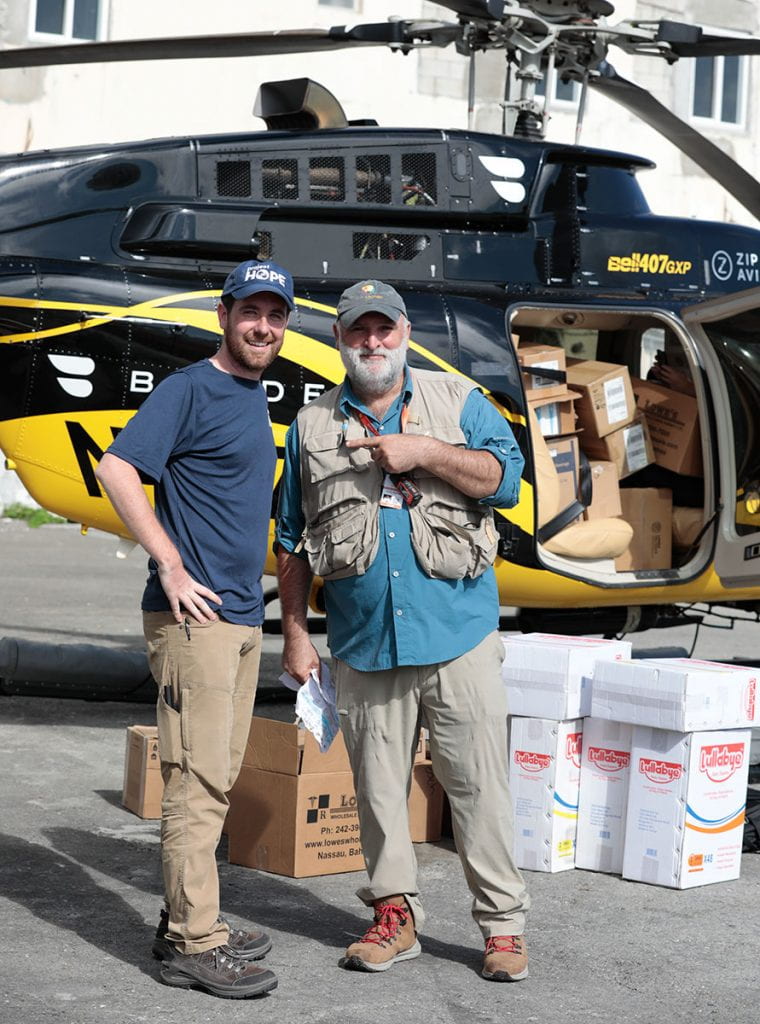Tom Cotter ’10 helps direct pandemic relief around the world through Project HOPE
By Vicki-Ann Downing
Tom Cotter ’10 has spent the decade since his Providence College graduation on the front lines of public health disasters — from a polio vaccination campaign in Nigeria to cyclone response in Mozambique to hurricane relief in the Bahamas. But he has never experienced anything like the global pandemic caused by the coronavirus, COVID-19.
Cotter is director of emergency response and preparedness for Project HOPE, an international health care organization based in Bethesda, Md., that provides health training and disaster relief through 15 offices around the world. His work usually involves travel at a moment’s notice, but like most Americans, he is directing this crisis response from his home, in Virginia.
“I am managing a lot of things remotely, which is atypical for me,” Cotter said. “I’m doing a response by email while others are facing more risk than I am. It’s difficult not to be out there. But there is no one particular place to go in a situation like this. Our response is in 15 countries.”

During the pandemic, Project HOPE continues to train workers and provide supplies and volunteers with help from donations to its Global Health Emergency Fund. It has three regional offices in China, including one in Wuhan, where COVID-19 appeared late last year.
“We were frontline responders from the get-go,” Cotter said. “We started working with our partner hospitals to protect health care workers by leveraging networks and partnerships to import as much personal protective equipment — masks, gowns, and goggles — as we possibly could. We called everybody in our Rolodex. People were generous, and we purchased a lot. At the end of that response, we were able to provide almost five million pieces of PPE.”
Now that the situation in Wuhan has stabilized, Project HOPE is reversing the supply chain, arranging to ship hundreds of thousands of N95 masks from factories in China to the United States for distribution to health care facilities in New York and other large cities around the world.
Cotter also is overseeing the deployment of volunteer clinicians to staff field hospitals in major U.S. cities.
“This is the biggest health crisis on the planet,” Cotter said. “We went country by country, program by program, figuring out how we could use our infrastructure to support the response to the pandemic. And the result is that we’re responding everywhere we have a presence. We don’t deploy teams because no one can travel, so we’re working in places where we already are and supporting our colleagues there.”

Shortly after Cotter joined Project HOPE in June 2019, Hurricane Dorian struck the Bahamas. As the storm formed south of Puerto Rico, he was finishing up the first emergency response training for his colleagues.
“We all deployed right away, fresh out of the classroom,” Cotter said. “We landed in Nassau with staff and volunteers and started shipping critical medical supplies to clinics in the most hard-hit areas of Abaco. Then, as evacuations continued to Nassau, we began providing direct clinical care for evacuees there. We are still there now, doing recovering programming for vulnerable people.”
Cotter, who majored in public and community service studies at PC, has always felt the need to help in a crisis. When he was a college senior, a catastrophic earthquake struck Haiti. It affected 3 million people in the poorest country in the western hemisphere — and he wanted to be there.
During spring break, despite warnings that it was unsafe to visit, Cotter bought a plane ticket and went to Haiti anyway. He remembers that Dr. Joseph P. Cammarano, associate professor of political science, helped him fundraise to cover the costs of the trip.
Cotter came to PC intending to study on a pre-med track to become an emergency room doctor. While a student, he became a licensed EMT and worked for Universal Ambulance on Douglas Avenue near campus. But even that training did not prepare him for what he saw in Haiti, where he spent a week working alongside doctors in a clinic, performing the duties of a nurse.
After graduation, Cotter took the MCAT, the graduate exam for medical school, then boarded a flight to return to Haiti. Through his experience as a volunteer there, he realized he enjoyed helping multiple patients at a time. Instead of medical school, he earned a master’s degree in public health, with a concentration in international health and complex humanitarian emergency management, from Boston University in 2012.

PC’s public and community service studies program — the first of its kind in the country when it was established in 1993 — integrates community service with academics. Cotter remembers spending as much time in the community as he did in the classroom. He helped build neighborhood playgrounds, interned at Butler Hospital, and volunteered at the Chad Brown Community Health Center. The program introduced him to a world that was not like campus or his hometown of Kingston, Mass.
“It gave me a fluency in being able to move among communities that I’m not familiar with. That has served me well,” Cotter said.
Cotter interned with the World Health Organization in the Philippines and has worked throughout his career with Floating Doctors in Panama, eHealth Systems Africa, Americares, 2Seeds Network, Witt O’Brien’s, the Center for Health and Homeland Security, and the U.S. Department of Health and Human Services.
“The biggest takeaway for me is that people know what they need after a disaster,” Cotter said. “That was a lesson hard learned. I don’t think I really understood it back in my PC days. But the importance of giving communities what is really valuable to them, rather than what you think they need, has become more concrete to me.”
Though he has a background in disaster response, Cotter said he finds it difficult to comprehend the magnitude of the COVID-19 pandemic. But throughout the world, people are voluntarily cooperating with social distancing, and companies are contributing resources to help, all positive signs, he said.
“When it’s all over, as a global community, we’re not going to be the same,” Cotter said. “The way we think about our brothers and sisters in other countries and what they’re going through — it’s not going to be a matter of ‘those things are happening over there and they don’t affect me.’ We’re all in this together. Pandemics are a team sport. The teams are very big, and the more people on your team, the better.”
PC’s Public and Community Service Studies program inspired the work of Tom Cotter ’10. Please consider a gift to PC so that students with emergency need can have the same experiences.
support emergency student need




